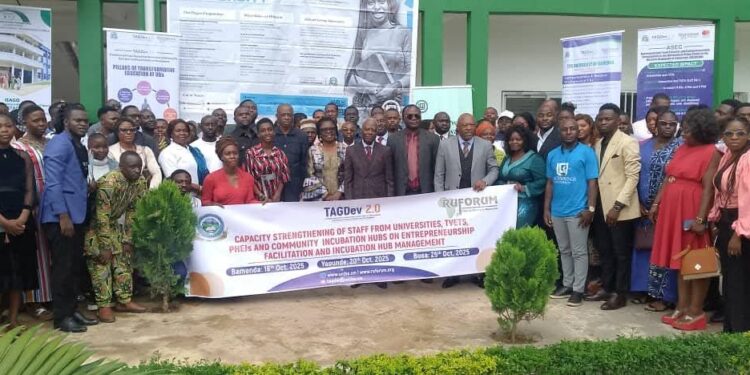Story, Louvier Kindo Tombe
A quiet revolution in higher education is taking root across Africa, one that seeks to transform how universities contribute to growth, innovation, and community resilience. Known as the Transforming African Agricultural Universities to Meaningfully Contribute to Africa’s Growth and Development (TAGDev 2.0) initiative, the program aims to empower Africa’s youth and their institutions to become engines of agricultural and socio-economic transformation.
In Cameroon, the University of Bamenda (UBa) is part of the consortium implementing the 10-year program in collaboration with RUFORUM and the Mastercard Foundation. As part of the initiative, officials of TAGDev 2.0 in Cameroon, led by Program Coordinator and UBa Vice Chancellor, Prof. Emmanuel Suh, recently organized a capacity-building workshop for partner universities at GreenSpring Digital University in Yaoundé on Monday, October 19, 2025.
During the workshop, educators, researchers, and university leaders gathered for an in-depth discussion around one key question: how can African universities meaningfully drive agricultural transformation and job creation for the continent’s youth?
The atmosphere was one of renewed purpose, with participants recognizing the urgent need for universities to evolve beyond traditional classroom teaching toward models that equip students with practical, problem-solving skills rooted in community impact.
According to Prof. Emmanuel Suh, the transformation must begin from within. “We need to transform our universities and higher institutes into brands — centers of excellence that combine teaching, research, and innovation to directly impact society,” he stressed.
“This initiative will retool staff and create unity between research and teaching. It’s about turning universities into engines of transformation — where knowledge meets action.”
That vision is at the heart of TAGDev 2.0. The program is not just about reforming agriculture education; it is about reimagining the role of higher learning itself.
Through curriculum review, policy reform, and pedagogical innovation, the program seeks to revolutionize teaching systems across African universities, making them more inclusive, relevant, and entrepreneurial.
The goal is to produce graduates who are not only employable but also capable of creating jobs, fostering innovation, and driving sustainable solutions.
Speaking at the workshop, Prof. Laurent Charles Boyomo, Vice Rector of GreenSpring Digital University, emphasized that higher education must adapt to remain relevant in today’s fast-evolving digital world.
“At GreenSpring Digital University, we believe that the transformation of Africa begins with the transformation of her institutions,” he said.
“What we teach is already available online, so as teachers, we must transform our minds and our methods to engage students in creating, not just consuming, knowledge.”
The Yaoundé workshop offered training on transformative education facilitation, gender inclusion and safeguarding, and entrepreneurial incubation hub management.
It aimed to strengthen the capacities of partner universities to inspire innovation-driven learning and integrate community service into academic life.
Beyond classrooms, the TAGDev 2.0 program has set ambitious goals for Cameroon — training over 2,500 out-of-school youth, supporting more than 170 startups and 70 university spinoffs, creating or enabling 30,000 jobs, planting 1.2 million trees, and retooling academic staff to reach 82,000 smallholder farmers.
These efforts reflect a broader commitment to expanding opportunities for young people, promoting climate-resilient agriculture, and raising the quality and relevance of higher agricultural education.
TAGDev 2.0 is therefore much more than an academic reform project; it is a call for a new university culture across Africa — one where teaching, research, and community engagement converge to create lasting impact.
By engaging both public and private institutions, the program is fostering a new generation of African universities that stand as brands of innovation, relevance, and transformation.
As the Yaoundé workshop concluded, one message echoed clearly through the halls of GreenSpring Digital University: the future of Africa’s agriculture — and its transformation — begins in the classroom.








